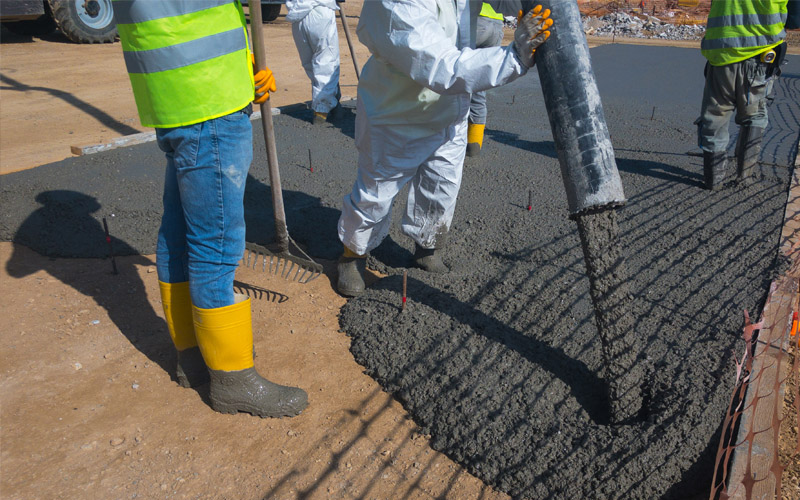For Utah home and business owners, it’s crucial to consider the season and weather prior to scheduling a concrete driveway installation. While summer may seem like the best option due to sunny days and comfortable, warm temperatures, this can lead to issues with the final product of your concrete. The process of installing concrete for a driveway can be tedious, as it may be affected by a variety of factors. This is why it’s always recommended to have a licensed company like Utah Concrete complete the installation steps.
Why Does Temperature Affect Concrete Installation?
To understand why concrete is affected by temperature, it’s important to know the makeup of the material. Concrete is made up of a mixture of cement, water, sand, and rock that is combined to create the mixture that is poured to form your driveway. The levels of water and moisture in the concrete mixture are crucial to the final product, which is why temperature can affect the installation process. When the air is extremely hot, it can cause the curing process to happen too quickly, meaning too much moisture is taken from the concrete. This can leave the material cracked and susceptible to structural damage.
What Is The Ideal Temperature To Pour Concrete?
While this may depend on your location, the environment, and the overall humidity levels, it is recommended to pour concrete anywhere from 60 to 80 degrees Fahrenheit. Depending on the humidity and other various factors, some professionals prefer to pour the mixture at a temperature between 50 and 70 degrees Fahrenheit. If you have any concerns about temperatures or concrete installation, reach out to a professional in your area.
What Problems Can Happen If Concrete Is Poured During Hot Weather?
If concrete is poured during extremely hot temperatures, it can lead to a variety of problems with the final product of your driveway. These issues can range from cosmetic blemishes to more serious situations like cracking, structural issues, and crumbling of the material. Read below to learn more about the problems that may occur if you have concrete poured during hot weather.
Cracking Of The Material
When concrete is poured during extremely hot or dry conditions, it puts the material at a greater risk of cracking during the curing process. This can cause not only visual disturbances to the top layer of your concrete but can also create an opportunity for water and excess moisture to penetrate deeper into the slab. If this occurs, it can lead to serious structural issues that could cause the longevity of your driveway to decrease and problems with overall functionality. Cracks are both a visual and structural issue that can be avoided with the proper techniques pouring in hot weather.
Shrinkage
Though all concrete shrinks during the drying process, if you pour during hot temperatures it can cause the material to shrink an exceptional amount. This can cause issues with your design plan, the functionality of the driveway, issues with soil erosion, and reduced strength. Increased evaporation and draining of the moisture is what causes this large amount of shrinkage, though it can be avoided in hot temperatures with the proper admixtures. Some people believe adding more water to the concrete mixture can help prevent excess evaporation. This is simply not true and can lead to more expensive problems after installation.
Issues Setting Joints
When a concrete driveway is poured, joints are added to the mixture to help assist with the expansion and shrinking of the materials. Adding these joints at predetermined intervals, typically smaller than cold joints, will help to prevent cracking by allowing the material to move freely during the curing process. When the temperatures are extremely hot, it can lead to severe issues with these joints that can cause major problems in the material. Be sure to contact a licensed professional or structural engineer to ensure each element of your driveway is accurate and able to withstand hot pouring temperatures.
Decreased Material Strength
Another major concern with installing concrete in high temperatures is the overall decrease in the material’s strength and structural integrity. If too much moisture is removed from your slab during the curing process, it makes it difficult for the material to form the necessary crystals to provide solid strength and resistance. There are various additives that licensed professionals can utilize to help decrease the risk of strength issues when pouring during hot weather seasons in Utah.
Contact Utah Concrete For Assistance
If you are planning on having a concrete driveway installed and are concerned about the hot Utah temperatures, be sure to contact a licensed and insured company for assistance. The expert team at Utah Concrete has years of experience and can help make sure the installation process is completed properly, regardless of environmental factors.

